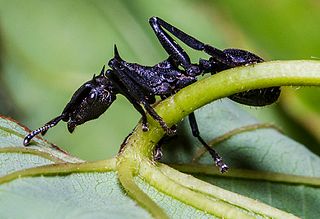
Cephalotes atratus is a species of arboreal ant in the genus Cephalotes, a genus characterized by its odd shaped head. These ants are known as gliding ants because of their ability to "parachute" by steering their fall if they lose their footing.

Cephalotes eduarduli is a species of arboreal ant of the genus Cephalotes, characterized by an odd shaped head and the ability to "parachute" by steering their fall if they drop off of the tree they're on. Giving their name also as gliding ants.

Cephalotes fiebrigi is a species of arboreal ant of the genus Cephalotes, characterized by an odd shaped head and the ability to "parachute" by steering their fall if they drop off of the tree they're on. Also known as gliding ants.
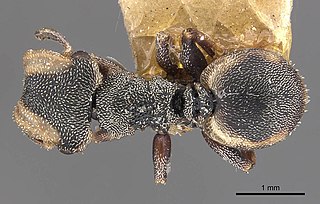
Cephalotes goeldii is a species of arboreal ant of the genus Cephalotes, characterized by an odd shaped head and the ability to "parachute" by steering their fall if they drop off of the tree they're on. Giving their name also as gliding ants.

Cephalotes grandinosus is a species of arboreal ant of the genus Cephalotes, characterized by an odd shaped head and the ability to "parachute" by steering their fall if they drop from the tree they are on, giving their name also as gliding ants.
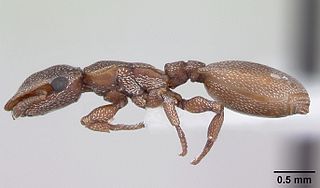
Cephalotes incertus is a species of arboreal ant of the genus Cephalotes, characterized by an odd shaped head and the ability to "parachute" by steering their fall if they drop off of the tree they're on. Giving their name also as gliding ants.

Cephalotes jansei is an extinct species of arboreal ant of the genus Cephalotes, originally erroneously called Exocryptocerus jansei by its discoverers, characterized by an odd shaped head and the ability to "parachute" by steering their fall if they drop from a tree, giving them the nickname of gliding ants. The species was probably native of Hispaniola, however, lack of more evidence makes this uncertain. Their larger and flatter legs, a trait common with other members of the genus Cephalotes, gave them their gliding abilities.

Cephalotes lanuginosus is a species of arboreal ant of the genus Cephalotes, characterized by an odd shaped head and the ability to "parachute" by steering their fall if they drop off of the tree they're on. Giving their name also as gliding ants. The species is native of Paraguay and the north of Argentina. Their larger and flatter legs, a trait common with other members of the genus Cephalotes, gives them their gliding abilities.

Cephalotes liepini is a species of arboreal ant of the genus Cephalotes, characterized by an odd shaped head and the ability to "parachute" by steering their fall if they drop off of the tree they're on. Giving their name also as gliding ants. The species is native of the Brazilian states of Goiás and Minas Gerais. Their larger and flatter legs, a trait common with other members of the genus Cephalotes, gives them their gliding abilities.

Cephalotes nilpiei is a species of arboreal ant of the genus Cephalotes, characterized by an odd shaped head and the ability to "parachute" by steering their fall if they drop off of the tree they're on. Giving their name also as gliding ants. The species is native of the Brazilian states of Minas Gerais and Rio de Janeiro. Their larger and flatter legs, a trait common with other members of the genus Cephalotes, gives them their gliding abilities and eases their arboreal movement.

Cephalotes pallidoides is a species of arboreal ant of the genus Cephalotes, characterized by an odd shaped head and the ability to "parachute" by steering their fall if they drop off of the tree they're on. Giving their name also as gliding ants.
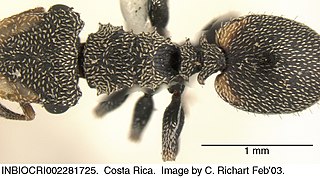
Cephalotes peruviensis is a species of arboreal ant of the genus Cephalotes, characterized by an odd shaped head and the ability to "parachute" by steering their fall if they drop off of the tree they're on. Giving their name also as gliding ants. They can be found in Peru, Costa Rica, and the Osa Peninsula.
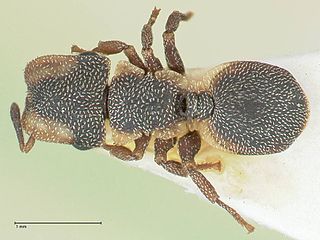
Cephalotes pinelii is a species of arboreal ant of the genus Cephalotes, characterized by an odd shaped head and the ability to "parachute" by steering their fall if they drop off of the tree they're on. Giving their name also as gliding ants.
Cephalotes ventriosus is a species of arboreal ant of the genus Cephalotes that has been found preserved in amber. They display the odd shaped head characteristic of gliding ants.
Cephalotes basalis is a species of arboreal ant of the genus Cephalotes, characterized by an odd shaped head and the ability to "parachute" by steering their fall if they drop off of the tree they're on. Giving their name also as gliding ants.
Cephalotes bloosi is a species of arboreal ant of the genus Cephalotes, characterized by an odd shaped head and the ability to "parachute" by steering their fall if they drop off of the tree they're on. Giving their name also as gliding ants.
Cephalotes porrasi is a species of arboreal ant of the genus Cephalotes, from central America. The soldier caste has the upper part of its head shaped like a disk. The worker caste has the ability to "parachute" by steering its fall if it drops off a tree, leading the ants to also have been classified as gliding ants.

Cephalotes pusillus is a species of arboreal ant in the genus Cephalotes, described in 1824 and characterized by its oddly shaped head and ability to glide if it falls from a tree, as gliding ants do.
Cephalotes serratus is a species of arboreal ant of the genus Cephalotes that has been found preserved in amber. They display the odd shaped head characteristic of gliding ants.
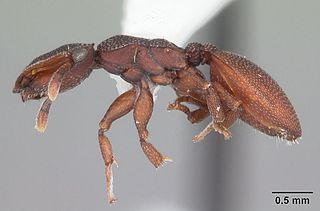
Cephalotes varians is a species of arboreal ant of the genus Cephalotes, characterized by an odd shaped head and the ability to "parachute" by steering their fall if they drop off of the tree they are on. This ability makes them one of several species known as gliding ants.















